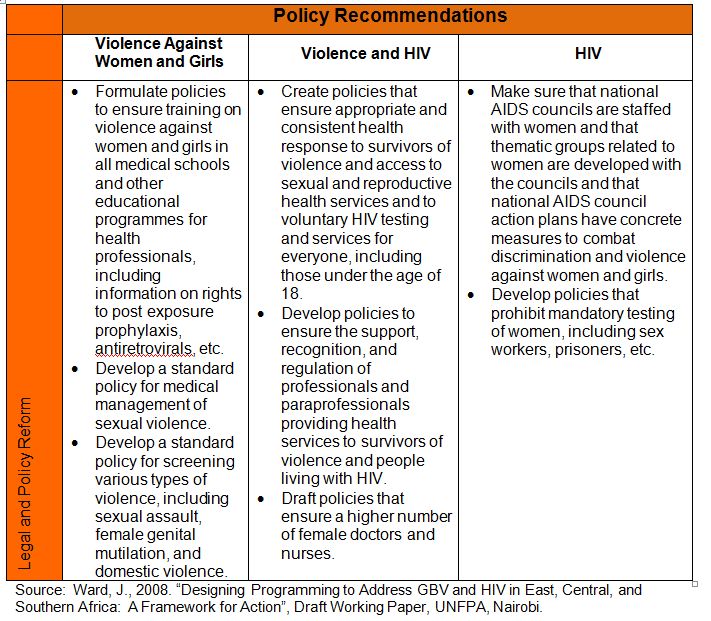- In order for the integration of HIV/AIDS and violence against women and girls programming to be successful, governments must fully commit themselves to protecting and promoting women’s human rights in relation to violence and HIV/AIDS prevention, treatment and care, including the following:

- A meeting of expert organizations and country representatives organized by UNFPA, UNDP, UN Women, UNAIDS, and WHO, with Sonke Gender Justice Network, Men Engage, and the ATHENA Network was held in Istanbul, Turkey (2011). This meeting was a follow-up to a first consultation held the previous year in Kenya. Both meetings were dedicated to reviewing and advancing work on "Integrating Strategies to Address Gender-Based Violence and Engage Men and Boys to Advance Gender Equality through National Strategic Plans on HIV and AIDS." To review the presentations of this conference, country action plans and additional resources, see the dedicated page on the Salamander Trust website.
Recommendations for Legislation
Legislation should address sexual and domestic violence and HIV and AIDS directly, in addition to other civil and political rights (e.g. marriage, inheritance, property) that can reduce risk and protect women and girls from experiencing abuse and/or becoming vulnerable to acquiring HIV.
Though HIV transmission and exposure have been criminalized in a number of countries with the intent of protecting women and girls, it is not only a violation of human rights, but has proven especially detrimental to women in the following ways:
1. Women will be deterred from accessing HIV prevention, treatment, and care services, including HIV testing
2. Women are more likely to be blamed for HIV transmission
3. Women will be at greater risk of HIV-related violence and abuse
4. Criminalization of HIV exposure or transmission does not protect women from coercion or violence
5. Women’s rights to make informed sexual and reproductive choices will be further compromised
6. Women are more likely to be prosecuted
7. Some women might be prosecuted for mother-to-child transmission
8. Women will be more vulnerable to HIV transmission
9. The most ‘vulnerable and marginalized’ women will be most affected
10. Human rights responses to HIV are most effective
For an explanation of each of these points, download the full document in English, French, German, Nepali, Polish, Portuguese, Russian and Spanish.
Source: extracted from Athena Network. 2009. 10 Reasons Why Criminalization of HIV Exposure or Transmission Harms Women..
Legislative reforms and/or introduction of new legal provisions are needed in the areas of:
o Civil law (e.g. orders of protection, compensation)
o Criminal law (e.g. consent)
o Evidence and Procedure (e.g. corroboration, cautionary rules, records and facts)
o Sentencing (e.g. minimums, aggravated offences and compelling circumstances)
For detailed guidance on legislation, see the tools below and the full module on legislation in English, French and Spanish.
Illustrative Tools:
Legislation Contagion: Building Resistance (Pearhouse, R./Canadian HIV/AIDS Legal Network, 2008). HIV/AIDS Policy & Law Review. Vol. 13, No. 2/3, December, 1 and 5-10. Available in English.
Respect, Protect and Fulfill: Legislating for Women’s Rights in the Context of HIV/AIDS – Volume One: Sexual and Domestic Violence (Canadian HIV/AIDS Legal Network, 2009). Available in English.
Respect, Protect and Fulfill: Legislating for Women’s Rights in the Context of HIV/AIDS – Volume One: Sexual and Domestic Violence Module 1: Rape and Sexual Assault (Canadian HIV/AIDS Legal Network, 2009). Available in English.
Respect, Protect and Fulfill: Legislating for Women’s Rights in the Context of HIV/AIDS – Volume One: Sexual and Domestic Violence Module 2: Domestic Violence (Canadian HIV/AIDS Legal Network, 2009). Available in English.
Additional Resources:
Policy Analysis Tool: Addressing Gender-Based Violence and Integrating Attention to Engaging Men and Boys for Gender Equality in National Strategic Plans on HIV and AIDS (ATHENA, HEARD, Sonke Gender Justice Network and Salamander Trust, 2010). Available in English.
Zero Tolerance: Stop the Violence Against Women and Children, Stop HIV/AIDS (Global AIDS Alliance, 2006). Available in English.
Scaling Up for Zero Tolerance: Civil Society Leadership in Eliminating Violence Against Women and Girls in Ghana, Rwanda and South Africa (Global AIDS Alliance, 2008). Available in English.
Reducing Women’s and Girls’ Vulnerability to HIV/AIDS by Strengthening their Property and Inheritance Rights (International Center for Research on Women, 2006). ICRW, Washington, DC. Available in English.
Estrategias nacionales sobre VIH y violencia contra las mujeres en America Latina y el Caribe: un reto impostergable (Luciano, D./Development Connections, 2007b). Available in Spanish.
